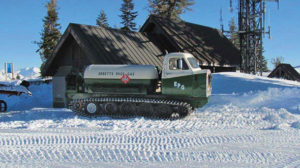Winterize your customers for the heating season
Earlier this year, firefighters in Worchester, Massachusetts, battled a house fire that displaced eight residents and caused an estimated $138,000 in damage after a local resident used a propane torch to thaw frozen pipes.
The state fire marshal’s office offered some alternative recommendations for thawing frozen pipes, such as wrapping an electric heating pad or towels soaked in hot water around the frozen area of the pipe, or using an electric hair dryer – all good tips to pass on to your customers.
In fact, now, before winter really sets in, is a good time to talk to your customers about using propane appliances to stay warm and safe this winter.
Heavy snow loads

Ebbetts Pass Gas uses a snowcat bobtail to service customers in the snowy, mountainous terrain of California. Photo courtesy of Ebbetts Pass Gas Service
In 2011, heavy snow loads providing a significant weight on tanks resulted in widespread propane leaks in the Serene Lakes area of Placer County, California, prompting evacuations and disconnection of power to homes. One leak caused an explosion that destroyed a home.
Placer County officials urged residents to clear snow from tanks to prevent leaks and possible explosions. Citing accumulations of more than 20 feet of snow in some areas, the county also suggested residents and businesses monitor roof vents, chimneys and flues for blockages from snow buildup.
Many homes in the Serene Lakes area are used seasonally. In cases like these, property owners should make arrangements to ensure that someone is on-site to offset potentially dangerous snow accumulations.
Don Vicari, general manager of Ebbetts Pass Gas in Arnold, California, knows a thing or two about heavy snow.
“Our staff at Ebbetts is very experienced with working in cold weather and in heavy snow. When we get a call about a propane leak or smell during heavy snow, we respond immediately as we would with any leak call, but we also send two employees because it can involve digging down to tanks that could be covered with 20 feet of snow,” says Vicari. “The locations of these tanks are marked so that we and emergency response personnel can find them and turn them off quickly. We have a very good relationship with our local responders and have provided extensive propane emergencies training to them, which has really served us and our customers.”
Inaccessibility: Out of gas, gas odor
What if an elderly person smells gas during a snowstorm without any way of getting to a neighbor’s home? It’s a challenging situation that propane professionals should plan for in conjunction with customers and emergency responders.
“Customers with limited ability to self-evacuate should contact emergency services first in the event of a potential gas odor or leak occurrence and then follow up by contacting their propane supplier,” recommends David Latourell, director of safety and transportation for Paraco Gas.
Extreme weather can make it challenging to service customers who require immediate assistance.
“In extreme conditions, if we have an out-of-gas situation that is inaccessible, we can get there with the snowcat bobtail (shown here),” says Vicari.
There are many other important safety tips for the winter that customers need to hear every year, such as never bringing outdoor propane appliances into the home. Take advantage of those resources developed by the Propane Education & Research Council at propane.com.
Remember that as propane professionals, your customers are counting on you to keep them and their families safe and warm this winter.
Stuart Flatow spent the past 18 years as the Propane Education & Research Council’s vice president for safety and training before stepping down in February 2019.
NOTE: The opinions and viewpoints expressed herein are solely the author’s and should in no way be interpreted as those of LP Gas magazine or any of its staff members.
















